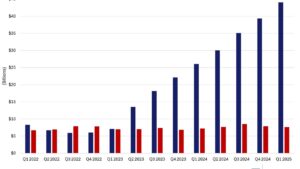We have warned, and warned and warned that the design of the anti-Russian sanctions are impairing the value of the dollar as the world’s reserve currency. In particular, we have been concerned about the status of the petrodollar. The US made a deal with Saudi Arabia in the 1970s where in exchange for the US providing security guarantees for the Saudis, they would ensure that all oil was priced and paid for in dollars. This created incredible worldwide demand for dollars and enabled the US to run insane annual deficits that we would monetize by printing dollars. Essentially, we’d import goods from overseas and pay for them in dollars we created at no cost to ourselves. Other countries would in turn use those dollars to buy oil.
When the US locked up the dollar denominated reserves of Russia, Putin responded by insisting that Russian oil be paid for in rubles, gold, or Bitcoin. European allies made a show of standing strong, and then started to pay for Russian gas and oil in rubles. This week, NATO member, Turkey agreed to buy Russian energy in rubles. Separately, Saudi Arabia is negotiating to sell oil to the Chinese in exchange for yuan. The dollar is the largest export of the United States, and the petrodollar was a huge driver of demand for dollars.
So, here’s the big question: We’ve been sending dollars overseas for decades. When other countries no longer have a need for dollars, what happens when they come back onshore in exchange for our goods and services? What if the owners of those dollars want to buy our real estate and businesses? Inflating the money supply always leads to inflation even if you can find a place to park the excess currency for decades.



